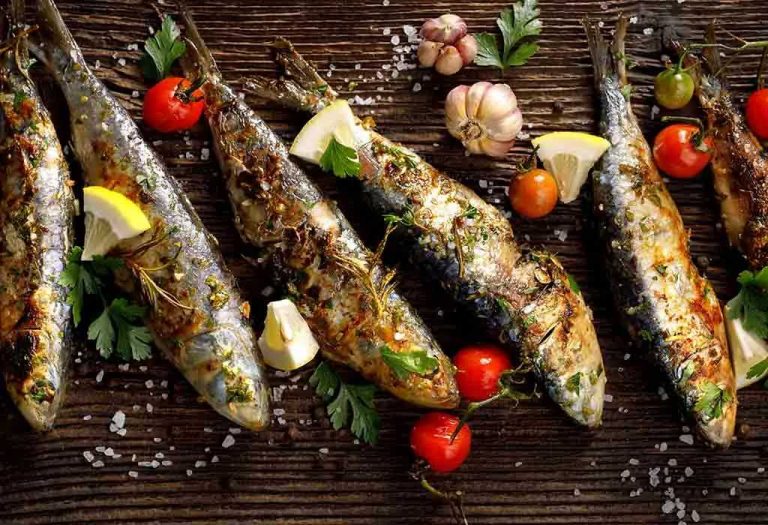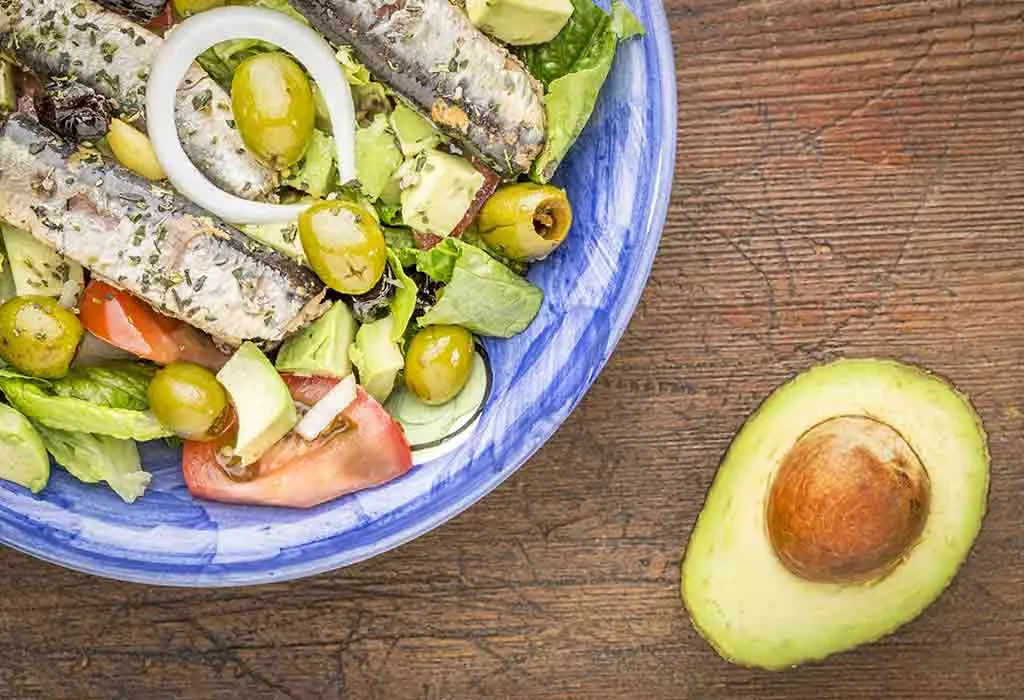Eating Sardines During Pregnancy – Is It Safe?
When maintaining a healthy diet during pregnancy, expecting mothers often seek clarity on what foods are safe to consume. Is consuming sardine fish good for pregnancy? Sardines, known for their rich nutritional profile, offer potential health benefits for both mother and baby. They are nutrient-dense, including protein and omega-3 fatty acids (3). Additionally, they contain less mercury than bigger species of fish. While scientific data supports the health advantages of fish consumption, certain hazards are associated with particular fish varieties. Sardines, in particular, are advantageous during pregnancy. This article explores the safety of consuming sardines while pregnant, delving into the benefits and risks to help expectant mothers make informed dietary choices.
Can You Eat Sardines While Pregnant?
Sardines are safe to consume during pregnancy since they contain very little to no mercury, making them an exceedingly safe and delectable source of nutrition for the baby. Pregnant women are advised to consume no more than 12 ounces of seafood every week to ensure their safety. The American Pregnancy Association does not encourage eating raw seafood during pregnancy due to the risk of being exposed to various illnesses. Sardines are safe to consume up to three times a week during pregnancy. Pregnant women should avoid raw or undercooked sardines since all raw fish sources risk germs and foodborne diseases. Indeed, most healthcare practitioners and groups dedicated to natural healthcare would concur with this advice.
Can Sardines Be a Healthy Choice for Pregnant Women?
Sardine fish is a highly nutritious option if you are expecting a child! Like other fish, Sardines are an excellent source of omega-3 fatty acids, essential for good health (2). According to the FDA recommendations, pregnant and lactating women must take 2-3 servings (8-12 ounces) of low-mercy fish each week, which indicates that sardines are safe to eat during pregnancy and lactation. An 8-ounce meal of sardines provides 2 grams of omega-3 fatty acids, which are beneficial for your and your baby’s brain and heart health. Omega-3 fatty acids are also believed to help decrease incidences of preterm delivery.
Do Sardines Have High Mercury?
Pregnant or nursing women are advised to consume between 8 and 12 ounces of seafood weekly (4). Because of their low mercury level, sardines are considered one of the finest alternatives for seafood consumption (7). Trace levels of mercury in almost all fish result from environmental pollution. However, predator species such as sharks, tuna, and swordfish have greater mercury levels than sardines because they graze on plankton instead of other fish. Smaller fish graze on plants and microorganisms, thus having lower mercury levels than their larger counterparts.
Benefits of Eating Sardines in Pregnancy
Here are some of the benefits of sardines during pregnancy:
- Vitamin D and calcium work together to stimulate new tissue production (primarily bone) (8).
- Sardines, a rich source of necessary fatty acids, play a crucial role in prenatal brain development. Research has linked high EPA/DHA levels with improved developmental outcomes later in life! In the final trimester, calcium is continually passed from mother to child, reaching 250-350 mg daily in some instances. Getting adequate calcium is also essential for helping to avoid preeclampsia in the mother-to-be.
- Vitamin B12 helps promote the growth of new cells that help develop tissues and organs.
How to Consume Sardines While Pregnant?
We’ve proved that sardines are safe and healthful to consume while pregnant, but the question of how to consume them throughout pregnancy remains an oft-quoted one.
1. On Crackers
Canned Sardines on crackers are a tasty snack that may be the thing to quench your hunger. Chop or slice them into small parts and serve them over a bed of lettuce leaves with shredded carrots on top for an added nutritious boost. You may use Worcestershire sauce or spicy sauce for a little more heat.
2. Fresh and Well-Cooked
Freshly purchased sardines must be properly cooked before consumption. Grilled with sea salt, parsley, lemon juice, and chilli powder, they’re a great side dish as a snack or as part of a bigger meal, such as with pasta or couscous, depending on your preference.
3. In the Salad
Sardines are an excellent method for boosting a salad’s protein content. This filling and protein-packed salad are made with canned sardines, cubed vegetables, and a dressing made with Greek yogurt and mayonnaise.
Precautions for Having Sardines in Pregnancy
While Sardines may be beneficial, you still need to exercise caution when consuming them during pregnancy. It is recommended to consume fish at most twice a week. Here are some things you need to take precautions against:
1. Listeriosis
Listeriosis is caused by a bacterium resistant to antibiotics and may be found in soil, plants, and water. You should avoid eating high-risk meals and adhere to guidelines while preparing and handling food to keep yourself safe (6). The infection may then be passed on to the baby, resulting in an early birth or a miscarriage in the mother. Listeria is a bacteria that can only be destroyed by heat and pasteurization. You keep yourself safe from listeriosis, so prepare your meals and avoid consuming dangerous items thoroughly.
2. Toxoplasmosis
Toxoplasmosis is a disease that is caused by a parasite that may be found in soil or meat. Human contamination may occur in two ways: consuming undercooked meat or fish and food contaminated with cat faeces (5). Pregnant women should follow the following recommendations to prevent contracting toxoplasmosis. When working with raw meat, dirt, or raw veggies, it is essential to wash your hands often. If you come into contact with raw meat, avoid rubbing your eyes. Consume well-cooked meats and seafood, and thoroughly wash fruits and vegetables before consuming them.
FAQs
1. Can I eat raw sardines when pregnant?
Raw fish is strictly prohibited during pregnancy, and sardine consumption is not recommended. Bacteria such as listeriosis or toxoplasmosis may be present in raw fish. Listeriosis is caused by bacteria, whereas parasites cause toxoplasmosis. These infections may be transmitted during pregnancy or delivery from mother to fetus. If the fish is not cooked properly, the microorganisms remain. They are contagious and may be passed on to your kid. Therefore, to minimize concerns, avoid raw sardines. tartars, carpaccio, Sushi, sashimi, and ceviche are all included in this category.
2. Can I consume smoked sardines in pregnancy?
As with raw fish, pregnant women should avoid smoked sardines at all costs. Raw and smoked fish may have the same bacterium. Toxoplasmosis and Listeria are examples of foodborne infections.
3. Can pregnant women eat frozen sardine?
A pregnant lady can consume frozen fish since it is safe. It is your responsibility to ensure that the cold chain has been maintained. It is possible to consume sardines when pregnant if you freeze them at home before consumption. Ensure that the freezer’s temperature is below -0.4°F/-18°C before using it.
4. Is it safe to eat canned sardines in pregnancy?
Canned sardines during pregnancy are generally considered safe since the canning process warms items to a certain temperature to make the fish commercially acceptable. As long as the fish is not expired and properly kept, germs or mould don’t contaminate it.
5. Is steamed sardine safe for pregnancy?
Steam cooking is often more than 158°F/70°C, the recommended temperature for sardine steam cooking. As a result, you will be permitted to consume sardines that have been cooked while pregnant.
6. Is it okay to eat sardines in early pregnancy?
In the first trimester, many women are concerned about miscarriage, and understandably, you’d want to be extra mindful of what you’re eating at this time. On the other hand, Sardines are low-risk fish that can be consumed throughout pregnancy. They are packed with nutritional advantages for both you and your developing baby. While nausea and morning sickness may cause you to lose your appetite during the first trimester, consuming 70 to 100 grams of protein per day is critical to keep you and your baby healthy. The current protein serving recommendations may need to be higher, so include protein with most of your meals during this time.
Fish are essential to a healthy, balanced, and nutritious diet for pregnant women. Sardines are a good alternative for pregnant women to meet the recommended weekly intake of 2-3 servings of fish and seafood (1). However, pregnant women should seek the advice of their healthcare providers for more specific dietary issues.
References/Resources:
1. Have you had your portion of fish this week?; Tommy’s; https://www.tommys.org/pregnancy-information/blogs-and-stories/im-pregnant/pregnancy-news-and-blogs/have-you-had-your-portion-fish-week
2. Rice. R; Fish and healthy pregnancy: more than just a red herring!; PubMed; https://pubmed.ncbi.nlm.nih.gov/9077255/
3. Healthy eating in pregnancy; nidirect; https://www.nidirect.gov.uk/articles/healthy-eating-pregnancy
4. Eating healthy during pregnancy; March of Dimes; https://www.marchofdimes.org/find-support/topics/pregnancy/eating-healthy-during-pregnancy
5. Toxoplasmosis; NHS; https://www.nhs.uk/conditions/toxoplasmosis/
6. Listeriosis; WHO; https://www.who.int/news-room/fact-sheets/detail/listeriosis
7. Advice about Eating Fish; FDA; https://www.fda.gov/food/consumers/advice-about-eating-fish
8. Eating During Pregnancy; Nemours KidsHealth; https://kidshealth.org/en/parents/eating-pregnancy.html
Also Read:
Eating Shrimp while Pregnant
Consuming Crab during Pregnancy
Is It Safe to Eat Prawns when Pregnant?
Is Eating Sea Bass While Pregnant Safe?
Was This Article Helpful?
Parenting is a huge responsibility, for you as a caregiver, but also for us as a parenting content platform. We understand that and take our responsibility of creating credible content seriously. FirstCry Parenting articles are written and published only after extensive research using factually sound references to deliver quality content that is accurate, validated by experts, and completely reliable. To understand how we go about creating content that is credible, read our editorial policy here.



































